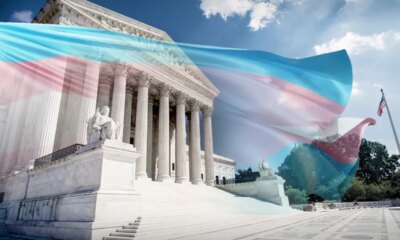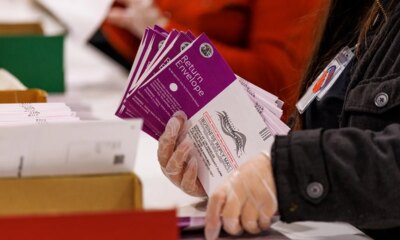California
Editorial: California voters should protect same-sex marriage from U.S. Supreme Court assault

No one, regardless of sexual orientation, should be deprived of the ability to marry the person they love.
That might seem like a fundamental and bedrock idea, but for California and the nation, it’s relatively new. And, unfortunately, there is no assurance the U.S. Supreme Court will remain on board.
That’s why voters in California’s Nov. 5 election must pass Proposition 3, which would update the state Constitution to match the mores of the 21st century.
The growth in national public support and legal protections for gay marriage over the past quarter century has been monumental.
Just 24 years ago, 62% of state voters approved Proposition 22, which affirmed in state law that only marriage between a man and a woman would be valid or recognized in California.
That was upended in May 2008, when the California Supreme Court ruled that same-sex couples had a fundamental right under the state Constitution to marry.
But later that year, 52% of California voters supported an initiative, Proposition 8, that added a ban on same-sex marriage to the state Constitution.
That was overturned with U.S. Supreme Court rulings in 2013 and 2015 that cleared the way for gay marriage in California and established a federal constitutional right nationwide.
Regrettably, that might not be the final word. The narrow 5-4 ruling in 2015 could be in danger with the conservative shift of the high court. Of the five justices in the majority nine years ago, only two, Elena Kagan and Sonia Sotomayor, remain on the court today.
Chief Justice John G. Roberts Jr., who today is considered one of the more moderate members of the court, dissented in the 2015 ruling. And, in the court’s 2022 ruling overturning constitutional protections for abortion rights, Justice Clarence Thomas issued a concurring opinion arguing that gay rights should also be subject to state-by-state review.
Thus, there is no guarantee that gay-marriage protections would survive review of the current U.S. Supreme Court any better than abortion rights did. Once again, a key issue of personal liberty could be relegated to each state to decide.
Making matters worse, right now in California, the 2008 wording of Proposition 8, even though struck down by the courts, remains in the state Constitution. Proposition 3 would fix that, repealing Proposition 8 and recognizing the fundamental right to marry, regardless of race or sex.
Proposition 3 would ensure California’s Constitution keeps up with changing public sentiment. In 2000, 38% of likely voters surveyed by the Public Policy Institute of California said they supported gay marriage. By last year that support had doubled, to 75%.
In polling this year for the Los Angeles Times, 71% of adults nationwide and 72% of Californians said that the 2015 U.S. Supreme Court ruling legalizing same-sex marriage in all states should be left intact.
There’s no guarantee that will happen. Californians should inoculate the state against a federal reversal of same-sex marriage rights by passing Proposition 3.
Originally Published:

California
Republican governor candidate Chad Bianco says he’s the ‘antithesis to California state government’

We are counting down to the California governor’s race. Chad Bianco, the sheriff of Riverside County, is one of the two biggest names running on the Republican ticket.
In a one-on-one interview with Eyewitness News political reporter Josh Haskell, Riverside County Sheriff Chad Bianco said, “I am the antithesis to California state government because I am going to take a nuclear bomb into that building and absolutely destroy everything that they do to us behind closed doors.”
Although he’s been elected by the voters twice, Bianco says he’s not a politician — which is why he believes his campaign for California governor is resonating, as reflected in the polls.
“President Trump, in one year, from 2025 when he took over, until now, did absolutely nothing to harm California. What’s harming California is 30 years of Democrat one-party rule that have created an environment here that no one can live in anymore. They’ve only been successful here in California because we vote D no matter what. You vote D or die. I mean, that’s it. Charles Manson would be elected in California if he was the only Democrat on the ballot,” Bianco said.
Bianco isn’t the only conservative Republican running for governor, and according to polling, he’s neck-and-neck with former Fox News host Steve Hilton.
SEE ALSO: CA governor candidate Steve Hilton says ‘everybody supports’ Trump’s immigration policies
Leading in some polls in the wide-open California Governor’s race as the June primary creeps closer is Republican and former Fox News host Steve Hilton.
“Steve has no chance of winning in November. The Democrats know that I’m going to win in November, and so they have to do everything they can to keep me out of that,” Bianco said.
When asked about the affordability crisis in the state, Bianco said, “Almost the entire issue of affordability in California is because of regulation, excessive regulation imposed by government. Every single regulation can be signed away with the governor’s signature.”
“It is a drug and alcohol addiction problem that, and a mental health problem,” he said about the homelessness crisis. “Every single bit of money that is going to these nonprofits that say ‘homeless,’ zero money. You’re getting absolutely nothing. I can’t tell you that we would end what we see in the homeless situation within a year, but I guarantee you we would never see it again after two years.”
When challenged on that prediction, pointing to how the state doesn’t have the facilities to treat the number of people living on our streets, Bianco responded, “We have been conditioned to believe that buildings take five years to build. It takes 90 days or less to build a house, but in California, it takes three to five years because the government won’t allow it. The regulations that are destroying this state are going to be removed with me as the governor.”
Bianco also said California jails shouldn’t have to play the role of treatment facilities.
Although he says he supports the Trump administration and wants the president’s endorsement, Bianco has been traveling the state — meeting not just with Republicans, but Democrats and independents as well. He says all of our state government officials have failed.
The primary election is June 2.
No clear front-runner in race for California governor, new poll shows
A new poll shows there’s still no clear front-runner in the race to replace Gov. Gavin Newsom.
Copyright © 2026 KABC Television, LLC. All rights reserved.
California
PlayOn Sports fined $1.1 million by California watchdog over student data violations

SACRAMENTO, Calif. (FOX26) — California’s privacy watchdog has ordered PlayOn Sports to pay a $1.10 million fine and change how it handles consumer data after finding the company’s practices violated state law in ways that affected students and schools in the state.
The California Privacy Protection Agency Board issued the decision following a settlement reached by CalPrivacy’s Enforcement Division.
The decision is the first by the board to address privacy violations involving students and California schools.
Schools across the country use PlayOn Sports’ GoFan platform to sell digital tickets to high school sporting events, theater performances, and homecoming and prom dances, with attendees presenting tickets at the door on their mobile phones.
Schools also use PlayOn Sports’ platforms for other sports-related activities, including attending games, streaming them online, and looking up statistics about teams and players.
In California, about 1,400 schools contract with PlayOn Sports for these services.
[RELATED] X faces possible fines as EU probes Grok nonconsensual, sexualized deepfakes
GoFan is also the official ticketing platform for the California Interscholastic Federation, the governing body for high school sports.
According to the board’s decision, PlayOn Sports used tracking technologies to collect personal information and deliver targeted advertisements to ticketholders and others using its services.
The company allegedly required Californians to click “agree” to tracking technologies before they could use their tickets or view PlayOn Sports websites, without providing a sufficient opt-out option.
“Students trying to go to prom or a high school football game shouldn’t have to leave their privacy rights at the door,” said Michael Macko, CalPrivacy’s head of enforcement. “You couldn’t attend these events without showing your ticket, and you couldn’t show your ticket without being tracked for advertising. California’s privacy law does not work that way. Businesses must ensure they offer lawful ways for Californians to opt-out, particularly with captive audiences.”
The decision also describes students as a uniquely vulnerable population and warns that targeted advertising systems can subject students to profiling that can follow them for years, expose them to manipulative or harmful content, and develop sensitive inferences about their lives.
Instead of providing its own opt-out method, PlayOn Sports directed students and other users to opt out through the Network Advertising Initiative and the Digital Advertising Alliance, which the decision said violated the company’s responsibility to provide its own way for consumers to opt out. The company also allegedly failed to recognize opt-out preference signals and did not provide Californians with sufficient notice of its privacy practices.
“We are committed to making it as easy as possible for all Californians — from high school students to older adults, and everyone in between — to make the choice of whether they want to be tracked or not,” said Tom Kemp, CalPrivacy’s executive director. “Californians can opt-out with covered businesses, and they can sign up for the newly launched DROP system to request that data brokers delete their personal information.”
Beyond the $1.10 million fine, the board’s order requires PlayOn Sports to conduct risk assessments, provide disclosures that are easy to read and understand, and implement proper opt-out methods.
The order also requires the company to comply with California’s privacy law prohibiting the selling or sharing of personal information of consumers between 13 and 16 without their affirmative opt-in consent.
California
California bill to bar police from taking second job with ICE advances in state Assembly

Wednesday, March 4, 2026 4:43AM
SACRAMENTO, Calif. (KABC) — A bill that would prevent police officers from moonlighting with federal immigration enforcement agencies, such as U.S. Immigration and Customs Enforcement, is advancing through the California State Assembly.
AB 1537 passed the State Assembly’s committee on public safety on Tuesday.
The bill also requires that officers report any offers for secondary employment related to immigration enforcement to their place of work.
Those failing to comply could face decertification as a peace officer in California.
The bill was introduced by Assemblymember Isaac Bryan, whose district includes Mar Vista, Ladera Heights, Mid-Wilshire and parts of South Los Angeles.
Copyright © 2026 KABC Television, LLC. All rights reserved.
-

 World1 week ago
World1 week agoExclusive: DeepSeek withholds latest AI model from US chipmakers including Nvidia, sources say
-

 Massachusetts1 week ago
Massachusetts1 week agoMother and daughter injured in Taunton house explosion
-

 Wisconsin3 days ago
Wisconsin3 days agoSetting sail on iceboats across a frozen lake in Wisconsin
-

 Maryland4 days ago
Maryland4 days agoAM showers Sunday in Maryland
-

 Denver, CO1 week ago
Denver, CO1 week ago10 acres charred, 5 injured in Thornton grass fire, evacuation orders lifted
-

 Florida4 days ago
Florida4 days agoFlorida man rescued after being stuck in shoulder-deep mud for days
-

 Massachusetts2 days ago
Massachusetts2 days agoMassachusetts man awaits word from family in Iran after attacks
-

 Oregon6 days ago
Oregon6 days ago2026 OSAA Oregon Wrestling State Championship Results And Brackets – FloWrestling

























